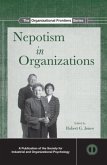Organizational Change
Psychological effects and strategies for coping
Herausgeber: Vakola, Maria; Petrou, Paraskevas
Organizational Change
Psychological effects and strategies for coping
Herausgeber: Vakola, Maria; Petrou, Paraskevas
- Gebundenes Buch
- Merkliste
- Auf die Merkliste
- Bewerten Bewerten
- Teilen
- Produkt teilen
- Produkterinnerung
- Produkterinnerung
Organizational change is a reality of working life, but what psychological effects does it have on individual workers, and what coping strategies can be used to mediate its impact? In this important new book, an international range of scholars examine the key psychological issues around organizational change,
Andere Kunden interessierten sich auch für
![How to Work with People... and Enjoy It! How to Work with People... and Enjoy It!]() Jenny BirdHow to Work with People... and Enjoy It!174,99 €
Jenny BirdHow to Work with People... and Enjoy It!174,99 €![Creative Career Coaching Creative Career Coaching]() Liane HamblyCreative Career Coaching189,99 €
Liane HamblyCreative Career Coaching189,99 €![Family Psychodynamics in Organizational Contexts Family Psychodynamics in Organizational Contexts]() Steen VisholmFamily Psychodynamics in Organizational Contexts186,99 €
Steen VisholmFamily Psychodynamics in Organizational Contexts186,99 €![Organizational Interventions for Health and Well-being Organizational Interventions for Health and Well-being]() Organizational Interventions for Health and Well-being200,99 €
Organizational Interventions for Health and Well-being200,99 €![Full Range Leadership Development Full Range Leadership Development]() John J SosikFull Range Leadership Development197,99 €
John J SosikFull Range Leadership Development197,99 €![Psychodynamic Organisational Theory Psychodynamic Organisational Theory]() Jacob AlstedPsychodynamic Organisational Theory153,99 €
Jacob AlstedPsychodynamic Organisational Theory153,99 €![Nepotism in Organizations Nepotism in Organizations]() Nepotism in Organizations186,99 €
Nepotism in Organizations186,99 €-
-
-
Organizational change is a reality of working life, but what psychological effects does it have on individual workers, and what coping strategies can be used to mediate its impact? In this important new book, an international range of scholars examine the key psychological issues around organizational change,
Hinweis: Dieser Artikel kann nur an eine deutsche Lieferadresse ausgeliefert werden.
Hinweis: Dieser Artikel kann nur an eine deutsche Lieferadresse ausgeliefert werden.
Produktdetails
- Produktdetails
- Verlag: Taylor & Francis Ltd (Sales)
- Seitenzahl: 180
- Erscheinungstermin: 20. April 2018
- Englisch
- Abmessung: 234mm x 156mm x 13mm
- Gewicht: 449g
- ISBN-13: 9781138230378
- ISBN-10: 1138230375
- Artikelnr.: 52494005
- Herstellerkennzeichnung
- Libri GmbH
- Europaallee 1
- 36244 Bad Hersfeld
- gpsr@libri.de
- Verlag: Taylor & Francis Ltd (Sales)
- Seitenzahl: 180
- Erscheinungstermin: 20. April 2018
- Englisch
- Abmessung: 234mm x 156mm x 13mm
- Gewicht: 449g
- ISBN-13: 9781138230378
- ISBN-10: 1138230375
- Artikelnr.: 52494005
- Herstellerkennzeichnung
- Libri GmbH
- Europaallee 1
- 36244 Bad Hersfeld
- gpsr@libri.de
Maria Vakola, Paraskevas Petrou
1. An overview of the impact of organizational change on individuals and
organizations: An introductory note Maria Vakola (Athens University of
Economics and Business), Paraskevas Petrou, (Erasmus University Rotterdam)
Resources as change facilitators 2. Organizational Change and Employee
Functioning: Investigating Boundary Conditions Victoria Bellou, (University
of Thessaly, Greece), Despoina Xanthopoulou, (Aristotle University of
Thessaloniki, Greece), Panagiotis Gkorezis, Hellenic (Open University and
Open University of Cyprus) 3. Change consultation during organizational
restructuring: Buffering and exacerbating effects in the context of role
stress Nerina L. Jimmieson and Michelle K. Tucker (Queensland University of
Technology, Australia) 4. Individual and external coping resources as
predictors of employees' change attitudes Alannah E. Rafferty (University
of New South Wales, Australia), Nerina L. Jimmieson (Queensland University
of Technology, Australia) Emotions and Cognitions and Change Outcomes 5.
Feelings about change: The role of emotions and emotion regulation for
employee adaptation to organizational change Karen van Dam (Open
University, The Netherlands) 6. How workers' appraisals of change influence
employee outcomes Professor Karina Nielsen (Norwich Business School,
University of East Anglia, UK) 7. Dynamics of trust and fairness during
organizational change: implications for job crafting and work engagement 8.
Organizational Change: Implications for the Psychological Contract Maria
Tomprou (Carnegie Mellon, US), Samantha D. Hansen (University of Toronto,
Canada) 9. Measuring Change Recipients' Reactions: The Development and
Psychometric Evaluation of the CRRE Scale Tsaousis Ioannis and Maria Vakola
Organizational-level and team-level facilitators of change 10. Destructive
uncertainty: The toxic triangle, implicit theories and leadership identity
during organizational change Pedro Neves (Nova School of Business and
Economics, Portugal), Birgit Schyns (Durham University, UK) 11.
Organizational change and health: The specific role of job insecurity
Birgit Köper (Federal Institute of Occupational Safety and Health, Germany)
Alexandra Michel (University of Heidelberg, Germany) 12. Improving our
understanding of collective attitudes towards change formation Gavin
Schwarz (University of New South Wales, Australia), Dave Bouckenooghe
(Brock University, Canada)
organizations: An introductory note Maria Vakola (Athens University of
Economics and Business), Paraskevas Petrou, (Erasmus University Rotterdam)
Resources as change facilitators 2. Organizational Change and Employee
Functioning: Investigating Boundary Conditions Victoria Bellou, (University
of Thessaly, Greece), Despoina Xanthopoulou, (Aristotle University of
Thessaloniki, Greece), Panagiotis Gkorezis, Hellenic (Open University and
Open University of Cyprus) 3. Change consultation during organizational
restructuring: Buffering and exacerbating effects in the context of role
stress Nerina L. Jimmieson and Michelle K. Tucker (Queensland University of
Technology, Australia) 4. Individual and external coping resources as
predictors of employees' change attitudes Alannah E. Rafferty (University
of New South Wales, Australia), Nerina L. Jimmieson (Queensland University
of Technology, Australia) Emotions and Cognitions and Change Outcomes 5.
Feelings about change: The role of emotions and emotion regulation for
employee adaptation to organizational change Karen van Dam (Open
University, The Netherlands) 6. How workers' appraisals of change influence
employee outcomes Professor Karina Nielsen (Norwich Business School,
University of East Anglia, UK) 7. Dynamics of trust and fairness during
organizational change: implications for job crafting and work engagement 8.
Organizational Change: Implications for the Psychological Contract Maria
Tomprou (Carnegie Mellon, US), Samantha D. Hansen (University of Toronto,
Canada) 9. Measuring Change Recipients' Reactions: The Development and
Psychometric Evaluation of the CRRE Scale Tsaousis Ioannis and Maria Vakola
Organizational-level and team-level facilitators of change 10. Destructive
uncertainty: The toxic triangle, implicit theories and leadership identity
during organizational change Pedro Neves (Nova School of Business and
Economics, Portugal), Birgit Schyns (Durham University, UK) 11.
Organizational change and health: The specific role of job insecurity
Birgit Köper (Federal Institute of Occupational Safety and Health, Germany)
Alexandra Michel (University of Heidelberg, Germany) 12. Improving our
understanding of collective attitudes towards change formation Gavin
Schwarz (University of New South Wales, Australia), Dave Bouckenooghe
(Brock University, Canada)
1. An overview of the impact of organizational change on individuals and
organizations: An introductory note Maria Vakola (Athens University of
Economics and Business), Paraskevas Petrou, (Erasmus University Rotterdam)
Resources as change facilitators 2. Organizational Change and Employee
Functioning: Investigating Boundary Conditions Victoria Bellou, (University
of Thessaly, Greece), Despoina Xanthopoulou, (Aristotle University of
Thessaloniki, Greece), Panagiotis Gkorezis, Hellenic (Open University and
Open University of Cyprus) 3. Change consultation during organizational
restructuring: Buffering and exacerbating effects in the context of role
stress Nerina L. Jimmieson and Michelle K. Tucker (Queensland University of
Technology, Australia) 4. Individual and external coping resources as
predictors of employees' change attitudes Alannah E. Rafferty (University
of New South Wales, Australia), Nerina L. Jimmieson (Queensland University
of Technology, Australia) Emotions and Cognitions and Change Outcomes 5.
Feelings about change: The role of emotions and emotion regulation for
employee adaptation to organizational change Karen van Dam (Open
University, The Netherlands) 6. How workers' appraisals of change influence
employee outcomes Professor Karina Nielsen (Norwich Business School,
University of East Anglia, UK) 7. Dynamics of trust and fairness during
organizational change: implications for job crafting and work engagement 8.
Organizational Change: Implications for the Psychological Contract Maria
Tomprou (Carnegie Mellon, US), Samantha D. Hansen (University of Toronto,
Canada) 9. Measuring Change Recipients' Reactions: The Development and
Psychometric Evaluation of the CRRE Scale Tsaousis Ioannis and Maria Vakola
Organizational-level and team-level facilitators of change 10. Destructive
uncertainty: The toxic triangle, implicit theories and leadership identity
during organizational change Pedro Neves (Nova School of Business and
Economics, Portugal), Birgit Schyns (Durham University, UK) 11.
Organizational change and health: The specific role of job insecurity
Birgit Köper (Federal Institute of Occupational Safety and Health, Germany)
Alexandra Michel (University of Heidelberg, Germany) 12. Improving our
understanding of collective attitudes towards change formation Gavin
Schwarz (University of New South Wales, Australia), Dave Bouckenooghe
(Brock University, Canada)
organizations: An introductory note Maria Vakola (Athens University of
Economics and Business), Paraskevas Petrou, (Erasmus University Rotterdam)
Resources as change facilitators 2. Organizational Change and Employee
Functioning: Investigating Boundary Conditions Victoria Bellou, (University
of Thessaly, Greece), Despoina Xanthopoulou, (Aristotle University of
Thessaloniki, Greece), Panagiotis Gkorezis, Hellenic (Open University and
Open University of Cyprus) 3. Change consultation during organizational
restructuring: Buffering and exacerbating effects in the context of role
stress Nerina L. Jimmieson and Michelle K. Tucker (Queensland University of
Technology, Australia) 4. Individual and external coping resources as
predictors of employees' change attitudes Alannah E. Rafferty (University
of New South Wales, Australia), Nerina L. Jimmieson (Queensland University
of Technology, Australia) Emotions and Cognitions and Change Outcomes 5.
Feelings about change: The role of emotions and emotion regulation for
employee adaptation to organizational change Karen van Dam (Open
University, The Netherlands) 6. How workers' appraisals of change influence
employee outcomes Professor Karina Nielsen (Norwich Business School,
University of East Anglia, UK) 7. Dynamics of trust and fairness during
organizational change: implications for job crafting and work engagement 8.
Organizational Change: Implications for the Psychological Contract Maria
Tomprou (Carnegie Mellon, US), Samantha D. Hansen (University of Toronto,
Canada) 9. Measuring Change Recipients' Reactions: The Development and
Psychometric Evaluation of the CRRE Scale Tsaousis Ioannis and Maria Vakola
Organizational-level and team-level facilitators of change 10. Destructive
uncertainty: The toxic triangle, implicit theories and leadership identity
during organizational change Pedro Neves (Nova School of Business and
Economics, Portugal), Birgit Schyns (Durham University, UK) 11.
Organizational change and health: The specific role of job insecurity
Birgit Köper (Federal Institute of Occupational Safety and Health, Germany)
Alexandra Michel (University of Heidelberg, Germany) 12. Improving our
understanding of collective attitudes towards change formation Gavin
Schwarz (University of New South Wales, Australia), Dave Bouckenooghe
(Brock University, Canada)








